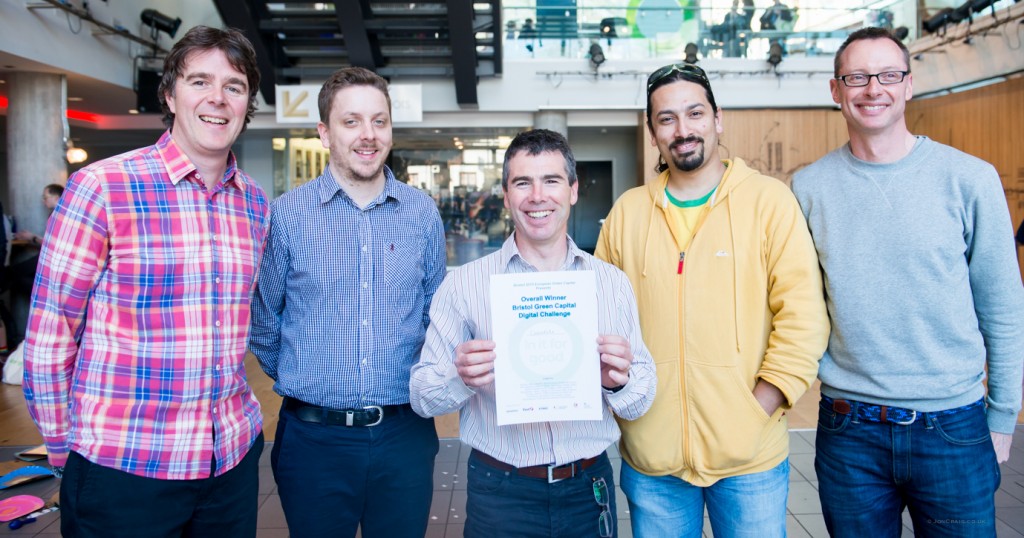A team of Bristol tech experts have used their spare time to devise an app that aims to revolutionise the school run by getting more children to walk or cycle.
By using the app, called Crocodile, parents can track the progress of the children on their way to and from school – which in turn will promote safety and healthier lifestyles and could drastically reduce car use.
While across the UK around 40% of schoolchildren dropped off still by car, there is a growing use of ‘walking buses’ and ‘cycling trains’ which offer an active way for pupils to get to school safely, by foot or by bike, escorted by adult volunteers.
Much like regular buses or trains, these have pick-up times and designated stops along the route – which is where Crocodile comes in.
The team behind the app – Kevin Ramm, Chris Thurling, Jon Waring, Carl Sargunar and David Smith – are all passionate about the environment and worked on Crocodile in their spare time, alongside their day jobs.
It has now beaten five other finalists to win the £50,000 Bristol 2015 Green Capital Digital Challenge, part of a year-long festival celebrating innovations in green technology. Sustainability solution expert Kevin Ramm said: “We were shocked to discover that every school day in the UK, around 40% of primary school children are dropped off by car.
“We also learned that a high proportion of rush-hour traffic in towns and cities is due to school-runs by car. High traffic volumes cause continued poor air quality in UK cities, linked to asthma and other health problems. Walking buses and cycle trains offer a great alternative to commuting to school by car.
By catalysing more active travel for children, Crocodile should also bring health and fitness benefits, and increase social interaction between children.
“There is also an expected educational benefit – research has shown that children who walk, scoot or cycle to school arrive more alert and ready to learn.”
Parents can use the app to view the walking bus routes nearest to them, book their child into their preferred route, check progress on the day and confirm that their child has arrived at school safely.
As well as providing an easy tool for parents to engage in more environmentally friendly ways to get their children to school, the app also generates useful analytics for schools and walking bus sponsors. The Crocodile team hopes this will help schools to understand trends in walking bus activities and encourage them to introduce reward schemes for pupils, classes or year groups that adopt greener travel habits.
The team has developed a short film which explains how it works.
It is anticipated that the cash prize will free up at least two members of the team to be able to work on the app full time, starting with a pilot phase in the Bristol and Bath area and then extending to as many schools as possible.
Kevin added: “If we can make even a small contribution in reducing the proportion of children travelling to schools in cars, so that they regularly walk or cycle to school instead, then we will be very happy!
“With more than 1 million UK primary school children regularly commuting by car, a small percentage reduction can make a big difference. While we might target the UK initially, car school runs is an issue in many developed countries, so ultimately we would like to see Crocodile go international.”
A runner-up ‘People’s Choice’ prize of £10,000 was awarded to a team of developers from the Bristol Games Hub who designed Future City Simulator, a game where players are in charge of making decisions about how their city creates and uses resources, such as food.
The impact of their decision is played out through stories told by characters who are citizens in their city, giving real insight into how the decisions we make as a community can have a big impact on our environment
In total, 33 international teams entered the Bristol 2015 Green Capital Digital Challenge, when 11 teams competed in a hack weekend to develop software applications and games that tackle environmental challenges. Judges included Ed Parsons of Google and Siobhan Reddy of Media Molecule. There were also six shortlisted teams, who received £5,000 each to further develop their ideas ahead of the final last Monday
The final was hosted at Colston Hall to coincide with Green Youth Day, another Bristol 2015 event. The young delegates at the summit voted for the team that they wanted to win the Peoples’ Choice Award.
All of the finalists will come together again at Venturefest Bristol & Bath on June 9, at the Passenger Shed by Bristol Temple Meads, to showcase the prototypes that they have built.
Google geospatial technologist Ed Parsons said: “We live in a networked world of millions of computers, billions of online users and trillions of bytes of information, all connected and accessible via devices we carry around in our pockets.
“This networked world offers for the first time both a way of individuals to contribute and consume content about the world around them, and allows the efforts of a few to be multiplied many times. I believe Crocodile is exactly the sort of initiative we should be supporting to demonstrate how this network effect can lead to more sustainable behaviours.”
The Digital Challenge is part of a year-long series of activities and initiatives that make up the International Green Technology Festival.
Pictured, the Crocodile team, from left: Chris Thurling, David Smith, Kevin Ramm, Carl Sargunar and Jon Waring































